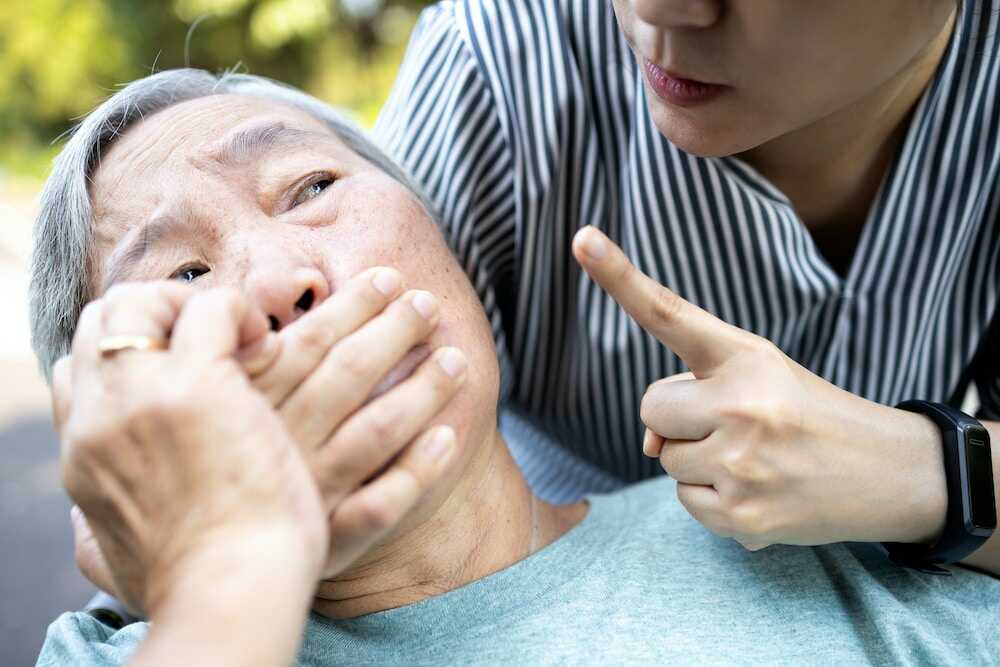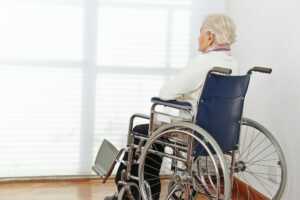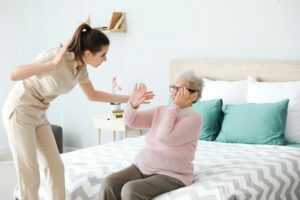
Whether intentional or not, failure to provide adequate care for an at-risk person (such as someone who is elderly) is criminal. Whenever someone with power exerts their influence over an elderly person, harming them or otherwise putting them at serious risk of harm in the process, their actions — or lack thereof — are considered elder abuse. According to the National Council on Aging, one in 10 Americans aged 60 or older has suffered from at least one of the seven forms of elder abuse. Some of the most serious cases occur in skilled nursing assisted living centers and nursing homes.
7 Forms of Elder Abuse

- Physical Abuse: Inflicting physical pain or injury upon an older adult. This may include slapping, punching, kicking, pushing, shoving, force-feeding, improperly restraining, and/or unnecessarily confining the person. Signs may include contusions, scars, symmetrical bruises, bone fractures, dislocations, sprains, broken eyeglasses, and unused medications or drug overdoses.
- Sexual Abuse: Touching, fondling, intercourse, or any other sexual activity with an older adult when the older adult is unable to understand, unwilling to consent, threatened, or physically forced. Signs of this include diagnosis of a Sexually Transmitted Disease (STD) and bruises around breasts, genitals, or buttocks.
- Emotional or Psychological Abuse Verbal assaults, threats of Abuse, harassment, or intimidation
- Confinement: Restraining or isolating an older adult other than for medical reasons. Are you being prevented from visiting your loved one? Do staff members prohibit visitation?
- Passive Neglector Abandonment: A caregiver’s failure to provide an older adult with life’s necessities, including, but not limited to, food, clothing, shelter, or medical care.
- Willful Deprivation: Denying an older adult medication, medical care, shelter, food, a therapeutic device, or other physical assistance, and exposing that person to the risk of physical, mental, or emotional harm—except when the older, competent adult has expressed a desire to go without such care.
- Financial Exploitation: The misuse or withholding of an older adult’s resources by another.
Elder Abuse at Nursing Homes

- Bedsores
- Body odor
- Dehydration
- Dirty clothes
- Self-neglect
- Unidentified medical conditions or sudden worsening of health
- Untidy and/or unsafe living conditions
- Untreated infections
- Weight loss or malnutrition
Sometimes, neglect and/or Abuse levied against the elderly is psychological. Examples of this include:
- Humiliation
- Ignoring
- Intimidation
- Isolation
- Ridicule
- Terrorizing

Watch for signs that a nursing home staff member could be psychologically abusing your elderly loved one:
- Anger
- Fear and/or avoidance of a particular caregiver
- Depression
- Sudden changes in mood or behavior
- Withdrawal from activities previously enjoyed
Nursing Home Liability Nursing homes have the legal duty to provide the following, according to federal law:
- Assess each patient to ensure a complete care plan is written and followed for each resident’s needs.
- Assist incontinent residents to minimize accidents.
- Bathe and groom residents often, dress them appropriately, prepare and serve nutritional meals on a regular basis, hygienically assist them to and from the toilet, and assist them so they can safely move about the facility.
- Eliminate and treat bedsores to prevent infection.
- Guard against medication errors.
- Maintain accurate, complete, and accessible records for each resident.
- Offer pharmaceutical services.
- Promote quality of life.
- Provide ready access to water and other beverages, ensuring adequate hydration.
- Provide sufficient nursing staff at all times.
- Provide treatment and devices, so residents can see and hear to the best of their ability.
- Treat residents with dignity and respect.
- Uphold the Nursing Home Patient’s Bill of Rights.
Nursing Home Patient’s Bill of Rights
Those rights include the following:

The Nursing Home Reform Act established the following rights for nursing home residents:
- The right to freedom from Abuse, mistreatment, and neglect;
- The right to freedom from physical restraints;
- The right to privacy;
- The right to accommodation of medical, physical, psychological, and social needs;
- The right to participate in resident and family groups;
- The right to be treated with dignity;
- The right to exercise self-determination;
- The right to communicate freely;
- The right to participate in the review of one’s care plan and to be fully informed in advance about any changes in care, treatment, or change of status in the facility and
- The right to voice grievances without discrimination or reprisal.
What to Do

The best way to guard against elder abuse and/or neglect is to visit your loved one often. Get to know the staff members on a first-named basis. Endear yourself to them by asking about their personal life (without being intrusive). Bring treats for them as well as your family members in the facility. If possible, get permission to take your loved one outside for a walk or even a ride in the car so they will feel free to speak up about anything amiss at home. Ask about their experiences and read between the lines.
If You Suspect Nursing Home Abuse
- If an elderly loved one is in immediate danger, call 911.
- Remove them from the situation immediately.
- In a less urgent but no less serious matter, such as suspected rape, assault, or fraud, call the police to report the crime. Do this for the sake of your elderly loved one and to prevent future abuses to others.
- Contact an attorney.
- Don’t ask the staff about your concerns until you seek legal advice. An experienced personal injury attorney, such as the ones at Moet Law in Irvine and Ontario, California, will be able to advise you about the next steps. Call today for a free case evaluation at (866) 424-0789.